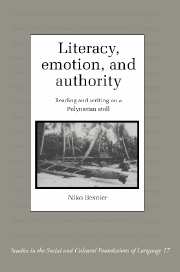Book contents
- Frontmatter
- Contents
- List of illustrations and tables
- Acknowledgments
- Transcription conventions and orthography
- 1 Introduction
- 2 The ethnographic context
- 3 The domains of reading and writing
- 4 Letter writing and reading
- 5 Letters, economics, and emotionality
- 6 Between literacy and orality: the sermon
- 7 Literacy, truth, and authority
- 8 Conclusion
- Notes
- References
- Index of Tuvaluan words
- General index
7 - Literacy, truth, and authority
Published online by Cambridge University Press: 14 August 2009
- Frontmatter
- Contents
- List of illustrations and tables
- Acknowledgments
- Transcription conventions and orthography
- 1 Introduction
- 2 The ethnographic context
- 3 The domains of reading and writing
- 4 Letter writing and reading
- 5 Letters, economics, and emotionality
- 6 Between literacy and orality: the sermon
- 7 Literacy, truth, and authority
- 8 Conclusion
- Notes
- References
- Index of Tuvaluan words
- General index
Summary
In Chapter 6, I analyzed the formal structure of written sermons and their relationship to oral performances, church services, and other forms of public discourse. In particular, I tackled the vexing problem of why written sermons exist at all, since there is ample evidence from other contexts in which public speaking figures prominently that many Nukulaelae preachers are accomplished orators with little use for written prompts. I demonstrated that written sermons are not just mnemonic tools, but that they carry a variety of more or less explicitly articulated cultural associations: they contribute to the sense of order in the church service; they are embedded in patterns of commodity exchange; and they have pedagogical functions. Yet their meaning is even more complex. In this chapter, I demonstrate that sermons (be they in oral or written form) have a particular relationship to the truth. Furthermore, the context of sermon performances is characterized by peculiar authority relations between participants and distinctive ways of defining personhood. Through an analysis of sermons as performances and texts, I will show that sermons contribute to the distinctiveness of the social context in which they are embedded.
In the following, I explore sermons as both literacy and orality events. When my discussion applies equally to both, I do not distinguish between them, and I illustrate my arguments with excerpts from both written and oral sermons without discussing the mode in which the data were produced.
- Type
- Chapter
- Information
- Literacy, Emotion and AuthorityReading and Writing on a Polynesian Atoll, pp. 140 - 168Publisher: Cambridge University PressPrint publication year: 1995



